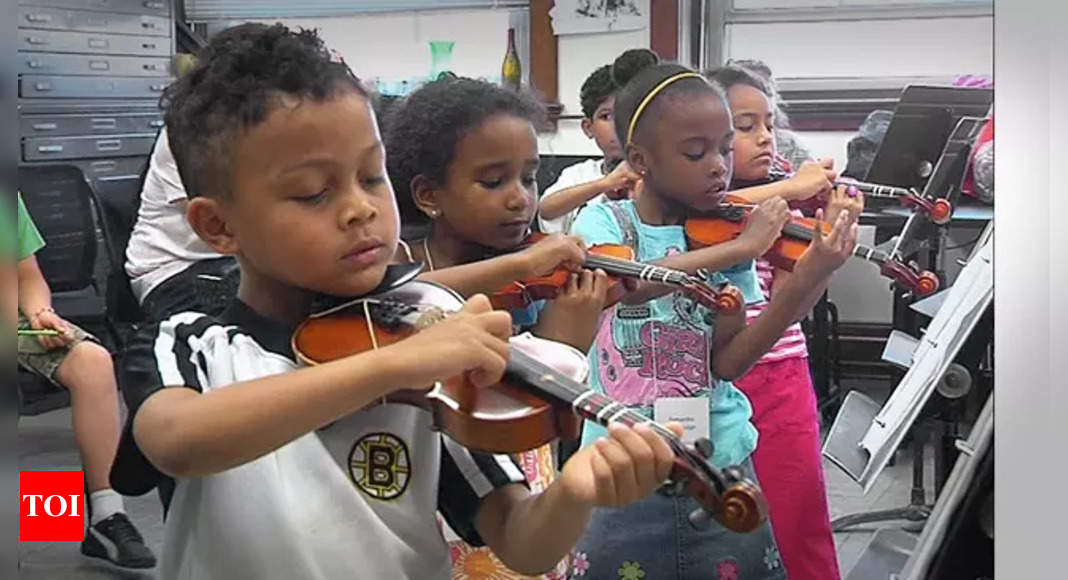WASHINGTON: In accordance with a research, exposing infants to music offers an ideal technique for constructing neighborhood improvement and interplay.
The research was printed by the Proceedings of the Nationwide Academy of Sciences.
Researchers at Vanderbilt College Medical Heart (VUMC), Marcus Autism Heart, Kids’s Healthcare of Atlanta, and Emory College College of Drugs enrolled 112 infants who had been both 2 months or 6 months previous.
The research tracked infants’ moment-by-moment eye-looking to disclose that the rhythm of caregivers’ singing causes toddler eye-looking to turn out to be synchronized or entrained to the caregivers’ social cues at sub-second timescales.
As early as 2 months of age, when infants are first participating with others in an interactive method, infants had been two instances extra more likely to look to the singers’ eyes time-locked to the musical beat than could be anticipated by likelihood.
By 6 months of age, when infants are extremely skilled in face-to-face musical video games and are creating more and more refined rhythmic and communicative behaviors like babbling, they had been greater than 4 instances as more likely to look to the singers’ eyes synchronized to the musical beats.
“Singing to infants looks as if such a easy act, nevertheless it is filled with wealthy and significant social info,” stated research lead creator Miriam Lense, PhD, assistant professor of Otolaryngology and co-director of the Music Cognition Lab at VUMC.
“Right here we present that when caregivers sing to their infants, they’re intuitively structuring their conduct to help the caregiver-infant social bond and toddler social studying.” Throughout testing, researchers used eye-tracking know-how to measure each motion of every toddler’s eyes whereas they watched movies of individuals participating them with music.
“For this research, we used movies of singing quite than stay singing to make sure that any change in toddler trying conduct was because of the toddler, and never the singer adjusting to the toddler,” Lense stated.
“Infants might look anyplace whereas watching the movies however we discovered that their trying conduct was not random.” “Critically, the predictable rhythm of singing is important for this entrained social interplay.
After we experimentally manipulate the singing in order that it not has a predictable rhythm, entrainment is disrupted and infants not efficiently synchronize their eye-looking to the caregivers’ social cues,” she added.
Researchers confirmed their findings in a special group of 6-month-old infants who watched each the unique movies of singing, in addition to movies that had been manipulated to be jittered in order that their rhythms had been not predictable.
Whereas the infants once more displayed entrained eye-looking to the unique movies when the singing was rhythmically predictable, this time-locked eye-looking impact was not current when the predictable rhythm had been disrupted.
“That is essential as a result of it reveals a exceptional bodily coupling between caregiver conduct and toddler expertise,” stated Warren Jones, PhD, the research’s senior creator and Nien Distinguished Chair in Autism at Emory College College of Drugs.
“With out aware consciousness, one thing as easy and intuitive as caregiver singing units in movement a complete cascade of behaviors that alters infants’ experiences.” “Though what a caregiver expresses is essential, when and the way they categorical social cues is especially essential for infant-caregiver communication,” Lense added.
“Rhythmic predictability – a common function of music – is an integral mechanism for structuring social interactions and supporting toddler social improvement.”Reyna Gordon, PhD, affiliate professor of Otolaryngology and co-director of the Music Cognition Lab at VUMC, stated the research underscores that making music will not be solely about leisure: making music is a core side of early socio-emotional improvement.
“It’s exceptional that these infants are mainly monitoring the beat of music with their eyes by modulating their eye contact with the singer’s eyes across the beat (or pulse) of singing,” stated Gordon, who was not concerned within the research.
“These findings characterize a serious step ahead in our understanding of the extent that very younger kids are delicate to musical rhythm, suggesting that innateness for music is intertwined with early social engagement,” she added.
The research was funded by the Nationwide Institutes of Well being (Nationwide Institute of Psychological Well being, Nationwide Heart for Complementary and Integrative Well being, Nationwide Institute for Deafness and Communication Issues) and the GRAMMY Basis.
Lense stated her staff has now prolonged the analysis to check synchronization in autism as a part of the Sound Well being Initiative, a partnership between the Nationwide Institutes of Well being (NIH) and the John F.
Kennedy Heart for the Performing Arts, in affiliation with the Nationwide Endowment for the Arts.
.



Comment here